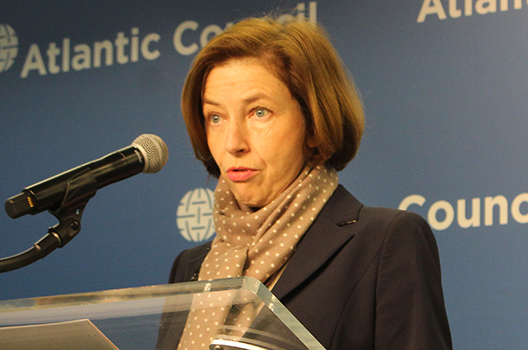Brève
Devant le Atlantic Council de Washington, Florence Parly fait de son discours sur les relations franco-américaines un plaidoyer en bonne et due forme en faveur d’une Europe autonome. Qu’un responsable français parle d’autonomie européenne, c’est tout sauf nouveau. Mais Parly articule l’ensemble de son intervention autour de ce concept et, devant un parterre de responsables US, elle n’hésite pas à mettre les pieds dans le plat, en évoquant de front les nombreux sujets qui fâchent.
La ministre commence par les éléments habituels de ce genre de discours, telle la référence incontournable aux soldats américains morts sur les plages de Normandie, ou la mise en scène comique d’une rivalité avec la Grande-Bretagne pour savoir lequel des deux alliés historiques de l’Amérique est le plus important et le plus efficace. Elle y ajoute un remerciement théâtral pour le maintien, aujourd’hui, de l’engagement « incroyable » des Etats-Unis en Europe. Si sa sincérité n’est pas en doute, toutefois, sur ce dernier point, le second degré n’est pas loin. Car jamais il n’a été aussi explicite que les USA ne font pas du bénévolat. En effet, face à un Trump qui se plaît à remettre en question l’Alliance atlantique, l’establishment militaro-diplomatique US ne cesse de souligner, depuis deux ans et de façon unanime, les multiples avantages de l’OTAN... pour les Etats-Unis.

(Crédit photo: Atlantic Council)
Cela n’a pas empêché la ministre française de mettre en avant l’incertitude qui pèse sur les garanties US – une incertitude par ailleurs inhérente, mais qui fut récemment mise en relief par les déclarations intempestives du président Trump. En rappelant les tergiversations de ce dernier autour de l’Article 5, Parly note que les Européens s’interrogent sur la pérennité de l’engagement américain. Et la ministre d’y glisser l’un des sujets tabou des relations transatlantiques : l'éventuelle prise en charge, entre Européens, de leur défense collective. D’après Parly, les Européens ont commencé à se préparer « juste au cas où » ils seraient abandonnés par les US et, à partir de l’article 42.7 du traité de l’UE, « l’idée selon laquelle une menace contre un de nos partenaires européens est une menace contre tous, doit gagner du terrain ». Tant qu’elle y est, Parly soulève un autre point délicat. La récente Initiative européenne d’intervention du président Macron vise, selon la ministre, à développer, entre pays prêts et capables, des capacités autonomes de planification et de conduite des opérations. Ce qui ressemble, à s'y méprendre, à de précédents projets écartés catégoriquement par Washington et Londres sous prétexte d’éviter les soi-disant duplications avec l'OTAN.
Mais Parly n'en reste pas là. Par un retournement habile du sempiternel reproche adressé aux alliés, elle affirme que les Européens devraient, en effet, cesser d'être les « passagers clandestins » de leur propre sécurité – et, dans cet esprit, ils devraient avoir voix au chapitre, notamment dans les négociations en matière nucléaire entre la Russie et les Etats-Unis. Le point d’orgue de l’intervention de la ministre fut, incontestablement, le passage sur l’industrie d’armement. Elle y fait subtilement écho aux récents propos du président Macron en faveur d’une préférence européenne, mais réfute d’emblée toute accusation de protectionnisme : « Je dis : réfléchissez bien. La Belgique achète des F-35. La Suède achète des Patriot. La Pologne achète des HIMARS. L’Europe a le marché de l’armement le plus ouvert. » Parly se dit « personnellement plus préoccupée par l’idée que la solidarité de l’OTAN puisse être conditionnée à l’achat de tel ou tel équipement par les alliés. » D’où cette formule qui va rester dans les mémoires : « La clause de solidarité de l’OTAN s’appelle article 5, pas article F35. »
Visiblement, la diplomatie française s'est rendu compte qu’il faut d’abord passer par Washington pour que les partenaires de l’UE osent se comporter comme tels et lèvent certains blocages. Le discours de Florence Parly s’adresse donc aux deux audiences à la fois. Elle y explique que l’autonomie n’est pas dirigée contre l’Amérique et qu’il n’y a pas de raison pour qu’elle conduise au désengagement US de l’Europe. Au contraire, dit la ministre, l’autonomie c’est notre manière de partager le fardeau – la seule, par ailleurs, qui puisse rééquilibrer le partenariat transatlantique. Sa logique est imparable, c’est celle de la France depuis des décennies. Laquelle a toujours buté sur les réticences des partenaires – des réticences que d'aucuns (tel un ancien planificateur au Département d’Etat ou l’ex-patron britannique de l’Agence européenne de défense) qualifient de « complaisance malsaine et déférence excessive vis-à-vis des Etats-Unis ». Certes, l’autonomie européenne serait, comme le note Robert Cooper (éminence grise du Service européen pour l’action extérieure de l'UE), tout à fait logique. Mais, poursuit-il, « Le monde ne procède pas par logique. Il procède par choix politiques ».




















